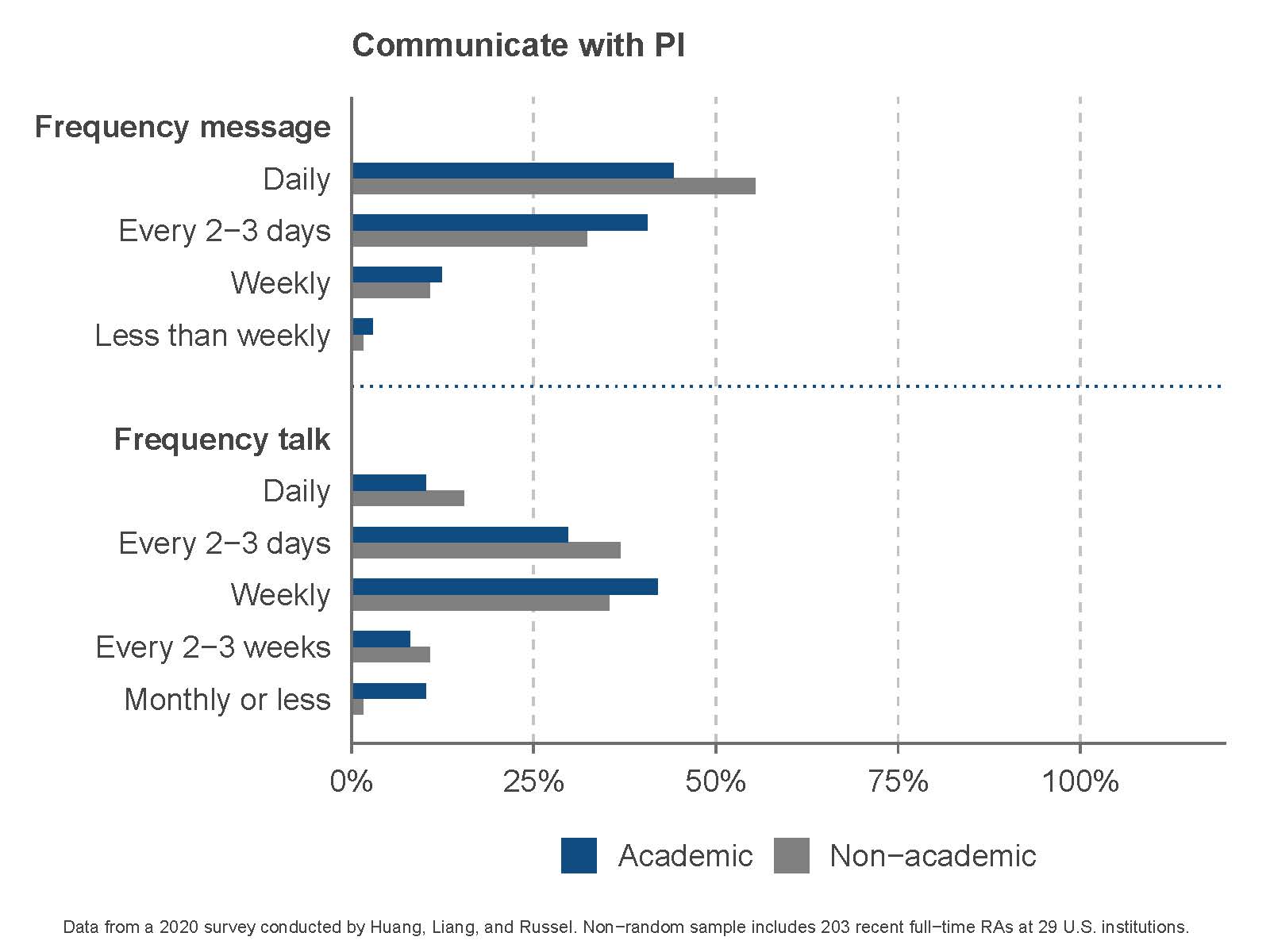Relationship with your PI
Your relationship with your PI can influence you greatly as you grow to be a better researcher. However, navigating your relationship with your PI can be challenging because it may feel quite different from your past experiences with college professors or supervisors in the private sector. As acknowledged in the economics department at Princeton’s Department Guidelines for Hiring PreDocs:
Predocs are among the most vulnerable members of the economics community. … the supervising faculty member has tremendous sway over their future careers.
Keep in mind that your PIs, like all people, will have their own limitations, blind spots, and constraints. Some research institutions have guidelines (see above) to help standardize and structure effective PI-RA relationships, but many do not. Consequently, you may sometimes find it challenging to communicate with your PI. Nonetheless, it is important that you learn how to work constructively with your PI. While no two PIs are the same, here’s some general advice on how to do so:
1. Remember that your relationship with your PI is primarily professional
Even if your PI eventually becomes your friend or collaborator, while you are an RA, your primary role is to help your PI with their work. Time permitting, your PI may appreciate your suggestions and creative input after you have completed the tasks assigned to you. Even though the nature of research work can be collaborative in nature, unless otherwise specified, your main task is to help your PI achieve their goals.

2. Set clear expectations
Even if it is difficult, it is important to ensure you and your PI are on the same page about how much you will work, when you should work, when you can take time off, what success or failure during the RAship looks like, and whether you’ll be able to dedicate time to personal development (taking a class, going to seminars, your own research projects, etc.). This may seem like a vague or even unimportant task, but we can assure you that expectations matter a lot! If communication with your PI isn’t easy for you, try reaching out to “veteran” RAs (if available) as a first point of contact for advice. Effectively setting expectations requires that you understand your own boundaries too, and we recommend aligning your expectations with your boundaries (see “Setting Boundaries” here).
3. Ask for feedback
Don’t hesitate to ask for comments on your work, especially towards the beginning of your RAship. Your PI likely understands that feedback helps you be more effective, but may not always remember to give you that feedback. Consider asking your PI for feedback in informal, day-to-day conversations, after a meeting, or through a more formal mechanism like regular performance reviews. Having feedback sessions can be a good opportunity for both you and your PI to reflect on parts of the RAship that are or aren’t going well for either of you. If your PI doesn’t take the lead on making this happen, you can ask first.
4. Ask for advice
PIs recognize their role as mentors to their RAs. Do not hesitate to ask your PI for advice on things like which classes to take and where to apply for grad school, or to request feedback on your personal research ideas or application materials. Some PIs will be able to dedicate more energy than others to mentorship.
5. Check in regularly
Your PI will most likely establish a meeting frequency and medium that best fits their schedule, e.g. weekly face-to-face meetings or team phone calls. However, even in lieu of such meetings, send emails (or post on Slack, Git, Asana, whatever platform your PI uses) at least every week or so to make sure your PI is up to date on what you’re doing and what challenges you’ve hit. It’s best for everyone if you do this frequently so you can avoid nasty surprises, like finding out you misinterpreted a request and have been working on the wrong task for several weeks. RAs report a wide range in how frequently they message and talk with their PIs- take some time at the beginning of your RAship to find a rhythm that works for you.

6. Communicate efficiently
PIs are generally starved for time (which is one of the reasons they’ve brought you on board!) so communicating efficiently is critically important.
- For day-to-day communication, prepare materials well in advance that will concisely support the questions and points you plan to raise. The output you get from the PI can only be as good as the input you give them.
- Mistakes happen! When they do, tell your PI honestly what’s going on as soon as you can, along with a plan to fix the issue. This will save everyone time and stress in the long run.
- If you encounter a problem while completing a task and need input from your PI, clearly summarize both the problem and what you’ve already done to try to resolve it yourself.
7. Find out who you can talk to if an issue comes up
In the event that your PI or anyone else in your workplace that makes you uncomfortable, from instances of inappropriate comments at work to sexual harassment (see Princeton’s guidelines for further examples), it is important to know who you can talk to. If available, a natural point of contact may be an RA manager, an HR representative, a university ombudsman, or a Title IX office representative, but the “right” person to contact may vary with management structure or the specific situation at hand. Ideally, this person will be someone you feel comfortable talking to who will be able to help resolve the issue while also working to protect you from any repercussions. Just remember that no matter how important and urgent your work or your PI’s work may seem, your rights as a person matter.